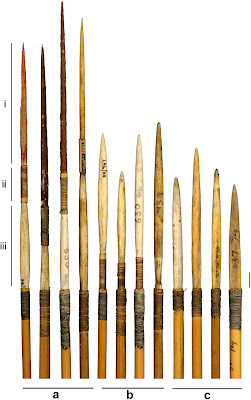The emergence of the first complex projectile weapon is hotly contested and extremely difficult to pin point in the archaeological record. Not only do wooden bows and atalatls decay rapidly and rarely survive to the modern day, the morphology of arrowheads is so varied that it is difficult to determine their precise purpose. Current theories attribute the invention of this technology to the behaviorally modern humans who migrated out of Africa in the Late Palaeolithic period around 45,000 years ago. However, recent studies are pushing that date back to the Middle Paleolithic of South Africa.
Location of Sibudu Cave, South Africa
Above: Bone Points recovered from the Howiesons
Poort Layers of the Sibudu Cave site
Below: Ethnographic Bushman Points, Type 3
 Lucinda
Backwell et al. from the University of the Witwatersrand, South Africa
conducted a morphometric analysis of the bone implements recovered from the
site with promising results. The researchers compared the artifacts with
similar bone tools from MSA and Later Stone Age (LSA) deposits (Blombos Cave,
Klasies River Mouth, and Peers Cave) as well as with ethnographic samples of
African Bushman assemblages. Overall, the points differ in size and morphology
from those from Blombos Cave which are larger and were more likely used as
spear point. Moreover, the morphology, texture, and use-wear evident on the
samples revealed remarkable similarities to that of fixed bone arrow points
used by Bushman. The identification of the Sibudu Cave bone points as possible
projectile points is further supported by the associated faunal remains found.
The predominance of small game at the site, such as the blue duiker and the
Gambian giant rat, indicates the presence of a closed forested environment in
which the use of a bow and arrow would have been more effective than
spear-hunting. Although more analysis needs to be done, Backwell’s findings
support the idea of the origin of complex projectile point technology in the
MSA.
Lucinda
Backwell et al. from the University of the Witwatersrand, South Africa
conducted a morphometric analysis of the bone implements recovered from the
site with promising results. The researchers compared the artifacts with
similar bone tools from MSA and Later Stone Age (LSA) deposits (Blombos Cave,
Klasies River Mouth, and Peers Cave) as well as with ethnographic samples of
African Bushman assemblages. Overall, the points differ in size and morphology
from those from Blombos Cave which are larger and were more likely used as
spear point. Moreover, the morphology, texture, and use-wear evident on the
samples revealed remarkable similarities to that of fixed bone arrow points
used by Bushman. The identification of the Sibudu Cave bone points as possible
projectile points is further supported by the associated faunal remains found.
The predominance of small game at the site, such as the blue duiker and the
Gambian giant rat, indicates the presence of a closed forested environment in
which the use of a bow and arrow would have been more effective than
spear-hunting. Although more analysis needs to be done, Backwell’s findings
support the idea of the origin of complex projectile point technology in the
MSA.
References:
Shea,
J. J. 2003. “The Middle Paleolithic of the East Mediterranean Levant.” Journal of World
Prehistory 17: 313-394.
Backwell, L., F. d’Erroco, and L.
Wadley. 2008. “Middle Stone Age Bone Tools from
Howiesons Poort
Layers, Sibudu Cave, South Africa.” Journal
of Archaeological
Science
Science


No comments:
Post a Comment